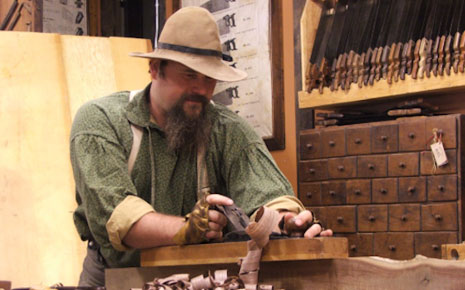
Carving Out His Niche: RVP 1875 Revives Lost Art of Furniture Making
June 26, 2025
Inside the century-old, red-bricked building at 115 S. Wilson Avenue in Jefferson is master woodworker Robby Pedersen. Surrounding him are 150 beautifully handcrafted designs he builds for his customers. Heirloom-worthy furniture that includes tables, beds, hutches, wardrobes, partners' desks, and secretaries.
“The waiting list is typically six months or so,” he said. “And I haven’t seen the end of the waiting list in 20 years.”
Covering the floor of RVP 1875, which serves as a living history lesson, working museum, and his showroom, is a layer of wood chips, curling as they spray out from underneath the pressure of his double-handled draw-knife. Neatly arranged on row after row of wood shelving extending from floor to ceiling are 19th-century hand tools, including 700 metal and wood-bodied furniture planes.
Pedersen’s bent, building furniture using only the tools available to the masters from 150 years ago, is one he oversimplifies.
“It’s nothing more than putting boards together to make strong furniture,” he says. “No glue, no nails, no staples, no power tools. But it’ll last for hundreds of years.”
Western Iowa Advantage (WIAD) encourages you to support this and all our amazingly talented small business owners as we celebrate National Families in Business Day on June 23rd… and beyond!
Go Figure It Out
The way Pedersen fell into his trade was what he describes as “a perfect storm.”
“I did woodworking in high school, glue and screw, but when I was in college I heard of an internship at Living History Farms in Urbandale. When I got there, they asked, ‘Ok, what are your interests? Blacksmith? Pioneer Farmer?’”
Woodworking was his answer. “The guy in charge of the internship program looks at me and says, ‘We haven’t had a furniture maker in years… Go figure it out.’”
The first piece Pedersen made by hand was an Immigrant’s Trunk. There were no books written on how to make one. No user’s manual. Nothing, really. “I didn’t know enough of what I was doing to do it historically correct,” he said. “That’s because the making was considered a trade secret. And those were secrets handed down from master to apprentice, most of which have been forgotten.”
100 Pots of Trial and Error
After ISU handed him a degree, he took over the woodworking shop at Living History Farms, where he remained for the next ten years. Honing his craft. Figuring it all out.
He spent thousands of hours researching how they made furniture in 1875. The tools, the techniques, even the finishes.
“I can crawl under a table and see what kind of joints were used. But the finishes? Nothing was written down,” he says. But what a few master furniture makers did leave behind was the family ledgers, a secret diary of sorts that held clues for someone with a keen eye. “I see a guy buying 30 pounds of raspberries for his furniture shop, and I doubt they’re making pie,” he said. “So, a hundred pots of trial and error later, I’ve figured out that maker's recipe for a finish using raspberries.”
Every finish he uses is hand-boiled using natural ingredients like raspberries, onions, and walnut husks, which create a rich, earthy fragrance that lingers throughout the shop.
“People walk in and say, ‘It smells amazing in here!’” People also know when he’s around the corner. “That scent kinda sticks to you. I’ve been told there’s an Eau de Robby that follows me around,” he laughed.
No Glue, No Nails, No Staples
RVP 1875 is considered the world’s leading historical woodshop. And every aspect of Pedersen’s process, from start to finish, is done authentically.
All seventeen native species of wood he uses, including Ash, Walnut, Butternut, and Poplar, have been chopped down with an ax.
“We’re also the first shop in 130 years to adopt the process of Triple Jointing,” he said. “Every piece of furniture is locked together at a single point with locking wooden joints. No glue, no nails, no staples, no plywood.”
A Class of Its Own
Historically, furniture-making apprenticeships involved a seven-year commitment that typically began when a boy was 13 years old.
The first three years were grunt work. Year one, sweep the floors. Year two, get a saw in your hands. Year three, a plane. It wasn’t until year four that you were actually given a chance to make furniture.
Today, Pedersen offers a miniature version, asking interested parties of any age to commit to two years of apprenticeship under his tutelage. If you don’t have two years to spare, he also offers weekend classes throughout the year. By the end of day three, you’ll be the proud owner of a piece of furniture you made yourself.
“It’s so satisfying to build with hand tools. You’ve got to know what every line in that wood is going to do when you hit it. And I think that’s a good thing. It makes it a deeper experience,” he said.
Best of Show
Despite a tech-obsessed world getting more obsessed with every passing day, Pedersen puts a high value on the benefits of learning a trade, like woodworking.
“I think I see the mass appeal of why it’s good for people’s souls; to get their hands on something and create something physical,” he said. “Seeing a stack of boards become this piece of useful art is so zen. Gosh, without it, I feel like a shell. Once you find something like this, you can’t pull it from underneath a guy.”
His love of history is rubbing off. Among the accolades RVP 1875 has enjoyed to date are being named 2013 Outstanding Tourism Business, 2015 Outstanding Retail Experience, and 2016 Outstanding Tourism Attractions in the State of Iowa by the Iowa Tourism Office and the Travel Federation of Iowa.
“I always say, ‘How lucky I was to find this trade. It’s brought me such joy. And how lucky the trade was that found me. We’ve been able to completely revive something that had been totally lost,” he said.
Plan your visit to RVP 1875 today or shop the collection of handcrafted furniture that is sure to become an heirloom for generations to come!
WIAD is ready to take on 2025, keeping an eye on education, support, and business tours while tackling workforce attraction and housing. We are committed to facilitating ongoing improvements in our region’s economy, quality of life, and tourism. Contact us today at 712.792.9914 or info@westerniowaadvantage.com and see how easy it can be!


